
…or someone doesn’t use Oxford commas in headlines.
I know which one I think it is.
To be able to say "Noggle," you first must be able to say "Nah."

…or someone doesn’t use Oxford commas in headlines.
I know which one I think it is.
But I would not include photos of a gun cabinet (not even a gun safe, but a gun cabinet) in a real estate listing.

We’re having a little work done around Nogglestead, and every estimator and service professional that’s been by has wanted interior photos of the house, and that enough makes the conspiratal lobe of my brain throb.
Conspiratal lobe of the brain aside, photos of guns on a public real estate listing are right where burglars can see them.
From Our Oriental Heritage page 522:
Doubtless when India was wealthy, sceptics were numerous, for humanity doubts its gods most when it prospers, and worships them most when it is miserable.
Ah, but after listening to the Gods of the Market-Place, men will hear again from the Gods of Copybook Headings:
As I pass through my incarnations in every age and race,
I make my proper prostrations to the Gods of the Market-Place.
Peering through reverent fingers I watch them flourish and fall.
And the Gods of the Copybook Headings, I notice, outlast them all.
A perspective understood in the 1930s and before, but lost for the most part amongst the “elites” now.
Back when I read the Laura Ingalls Wilder books three years ago already, I said in the report on Litle Town on the Prairie:
The book continues to evolve as the character ages. In this book, she pays more attention to clothing and fashion than in other books, and the subtle content changes over the course of the series to reflect the age of the character. I appreciate the effort and effect.
In a long form post today, Yakubian Ape talks about how anime and now Disney updated content to adjust for the age of their audience, which is not so much children but people from whom they can shake money, which is no longer parents of children but adults with no lives and mentions, in passing, Harry Potter:
For one, there is nothing inherently wrong with shifting demographics. Look at the Harry Potter franchise – the books are often praised for gradually growing darker in tone and more mature in their themes as the narrative progresses. It’s often said they matured along with the children who first read The Sorcerer’s Stone when they were still in grade school. That’s not necessarily a problem, and for as critical as I can be of J.K. Rowling, if she did anything right with those books, advancing the maturity of the thematic framework as the timeline of the books progressed and the characters grew older would be it.
Which gives me an idea for a dark and gritty reboot of Little House on the Prairie. I’ll have to watch more Quentin Tarentino first to get myself in the right frame of mind for charactering the new and improved Pa.
From Our Oriental Heritage, page 450, on the end of the line of Ashoka:
States are built not on the ideals but on the nature of men.
I highlighted this because the Durant espouses Socialist ideas throughout, but here the Durant explains why socialism and communism and other authoritarian systems fail.
But in a couple of pages, no doubt, the Durant will again lament how an enlightened leader redistributed land/wealth but how his minister, progeny, or an amalgamation became corrupt and the idyll collapsed.
Also, a couple of From the Durant posts ago I said old school pulp writers mined history for story ideas. Apparently, modern pop culture makers mine history for names alone.
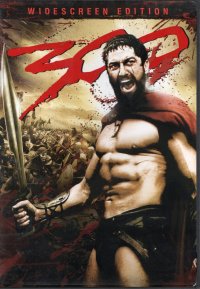 You know, I saw this film in the theater. I want to say it was at Crestwood Plaza, and my initial assessment was that it was with El Guapo, but given the timing of the film–it was four years past working with El Guapo, and but we were working across the street from each other downtown at the time. Perhaps I saw it with Gimlet, as I would have just finished working with his wife at the time. It’s only sixteen years ago, and already the memory is fuzzy.
You know, I saw this film in the theater. I want to say it was at Crestwood Plaza, and my initial assessment was that it was with El Guapo, but given the timing of the film–it was four years past working with El Guapo, and but we were working across the street from each other downtown at the time. Perhaps I saw it with Gimlet, as I would have just finished working with his wife at the time. It’s only sixteen years ago, and already the memory is fuzzy.
At any rate, this is a retelling of the story of the Spartans fighting the Persians at Thermopylae. Jeez, do I have to explain what that was? The Persians were looking to invade Greece, and a small contingent of soldiers from Sparta hold off the invasion at a narrow pass. The Spartans are all killed, though, but the Persian victory cost them–it was a Pyrrhic victory before Pyrrhic victories were named after Pyrrhus. Gerard Butler plays the Spartan king Leonidas, and he plays it with an Australian accent.
I mean, it’s based on a comic book, and they managed to capture a comic book feel to the film with its colors, some stylized slow-motion and different shots. It has a subplot about Leonidas’ wife trying to raise a Spartan army to bolster the 300–who are not an army per se as paid-off oracles prohibited gathering an army for battle–which kind of serves to pad the story a bit, but I’m sure the film cut a bunch from the comic books. They’re different media, of course, and the film is pretty good for what it is.
A strange bit–I found I had two copies of the DVD from various film-buying frenzies, which came in handy. I had some trouble with two DVDs I tried to watch one night–The Return of the One-Armed Swordsman didn’t play, and then I put in a copy of 300 which was balky before the title menu and then froze about half way through. So I paused my viewing for the evening, and I popped in the second copy of 300 the next night. Not only did it play flawlessly–alleviating my fear that the DVD player was getting wonky and I would have to deploy one of my several backups already, but the second copy played immediately from the same spot. Because, for the DVD player, it was the same disc.
The film also fits in with my reading, as I am into the second volume of The Story of Civilization, The Life of Greece. And like Reservoir Dogs, this book makes me want to rewatch another film. Or, rather, this film and what I’m reading. That film: The Warriors, a retelling of Xenophon and the Ten Thousand. Coming soon to a movie report near you? Time will tell! (But probably not as I have so many other films to watch, so rewatching DVDs and videocassettes is unlikely–unlike rewatching things I’ve seen in the past before buying them, sometimes again, on media.)
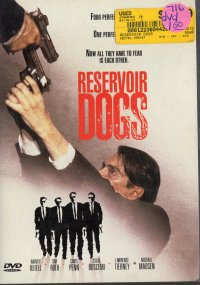 I got this film in February, and I popped it in because my oldest, who now has a job, income, and–from his perspective–everything one needs to be an adult so he can’t wait to move out and not have to clean his room–has gotten himself a Netflix subscription and is catching up on all the R-rated movies I’ve missed. Like this one.
I got this film in February, and I popped it in because my oldest, who now has a job, income, and–from his perspective–everything one needs to be an adult so he can’t wait to move out and not have to clean his room–has gotten himself a Netflix subscription and is catching up on all the R-rated movies I’ve missed. Like this one.
I have to admit that I’m not much of a Tarentino fan. I mean, I’ve seen Pulp Fiction, and I’ve seen From Dusk til Dawn. The only movie that I’ve enjoyed enough to rewatch is Jackie Brown. Come to think of it, this means I’ve seen his first four films (this was his first) and nothing after. I rented Kill Bill Volume 1 back when I had a video store membership, but I didn’t make it past the opening titles, or maybe the pre-title narration in the dark. I thought, “I don’t have to watch this brutality,” and I ejected the DVD and returned it unwatched (at $.50 a rental, I did that a couple of times with other films). But some years later, and having watched this film, I wonder how inured I have become to brutality in film–I remember thinking the most recent Conan revival wasn’t that bad. So maybe I will take a flyer on Kill Bill some other time.
But that’s a long digression.
The critic hearken this film back to noir thrillers from the olden days, and I can see it, albeit it’s in color and the actual cinematography doesn’t capture that. Instead, it reminds me a little more of the old black-and-white films which were quite clearly adopted from a play. After all, the film takes place in a single location, a “warehouse” that looks more like it would have been a garage, with only some other locations appearing through flashback.
At any rate, for those of you not familiar with the plot, a local crime figure has gathered a number of crime specialists to do a diamond heist. The first bit of the film takes place in a diner before the job. But then we switch to the warehouse after the job has gone bad–the police were apparently waiting for them. One of the bad guys has been gutshot and is brought in by a strongarm man who has befriended or befathered him in spite of the rules. Steve Buscemi’s Mr. Pink arrives and says that someone was a fink. That’s the basics. We get flashbacks from some of the main characters telling both how the robbery went wrong and how they prepared for it, and we find out fairly early who the undercover policeman is but have to wonder what will become of him.
There’s a brief torture scene–my beautiful wife said I’d never hear Stealers Wheel’s “Stuck in the Middle with You” the same way, but watching this film must have been her first and formative experience with the song and not mine, so it won’t affect my appreciation of Gerry Rafferty–and there’s a Mexican standoff and some amibuity in the end.
So it was not as brutal as I thought (although that might be me watching the film 30 years later–maybe it was indeed brutal for its time). An okay movie, but not necessarily something I’ll rewatch a bunch. It does make me want to rewatch Jackie Brown, though. For the Pam Grier, certainly, but also because it introduced me to Bobby Womack, whose CDs and records I’ve since acquired when I can.
Our Oriental Heritage, a footnote on page 407:
Perhaps poetry will recover its ancient hold upon our people when it is again recited rather than silently read.
I have often said this myself. Sixty years and more after the Durants said it first.
Youngest: I need to make something medieval. He says, referring to a summer project that he has chosen to wait until the night before the project is due.
Father: What do you mean medieval?
Youngest: From the Middle Ages.
Father: What do you mean the Middle Ages? From the fall of Rome to, what, 1400? That’s a thousand years.
Youngest: I want to make a mace.
Father helps son by providing a poster shipping tube and by pointing out you don’t have to make the ball completely out of aluminum foil, but he can instead make a ball of crumpled newspaper and cover it with foil, saving his parents $20 in aluminum foil.
Youngest: I need some string to attach it.
Father comes up with some twine and envisions the boy tying the head of the mace onto the shaft like a thong holding on the stone head of an axe.
But the boy makes clear that it he is going to tape the twine to the end of the shaft and then to the mace head.
Father: Oh, you’re making a morning star.
So I told the boy the history of the mace and its application in warfare. Part of the return to school is signing of the syllabi, where the parents and students review the content of each class and what they will cover.
And I thought, hubrisly, I might know more about history than the history teacher and more about literature than the English teacher.
I mean, I only have a bachelor’s degree, but I have continued to read for the, erm, couple of years since then. Which is, in many cases, longer than the teachers have been alive.
Granted, I am quite the outlier. But I would be happy to help my boys with their studies, at least in these subjects. When they come to me three-quarters of the way through the year with advanced algegra problems, though, I guess it puts me back into my place.
In a post about the debate last night (didn’t see it, not interested), he said:
Doug Burgum tore his Achilles tendon yesterday morning playing pick-up basketball. His participation was evidence of his determination and pain tolerance, but he was not up to par. Men older than 50 should not play pick-up basketball. I know several middle-aged men who have suddenly torn Achilles tendons, in every case playing basketball. They should stick to HORSE.
And here I promised my oldest son, who is now two inches taller and maybe twenty pounds heavier than I am, a basketball game this week.
When I tear my Achilles, I will know whom to blame.
Our Oriental Heritage, page 396.
Despite the continuity of the remains of Sind and Mysore, we feel that between the heyday of Mohenjo-daro and the advent of the Aryans a great gap stands in our knowledge, or rather that our knowledge of the past is an occasional gap in our ignorance. Among the Indus relics is a peculiar seal, compsoed of two serpent heads, which was the characteristic symobol of the oldest historical people of India–those serpent-worshiping Nagas whom the invading Aryans found in possession of the northern provinces, and whose descendants still linger in the remoter hills.
Where have I seen that symbol before? Oh, yeah, Conan the Barbarian.
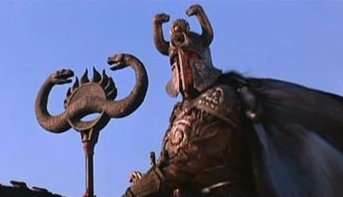
Those old school pulp guys knew how to mine history for their ideas in a way our modern uneducated pop culture makers cannot. I can see how someone exposed to this book of exotic history while it was new would come up with lots of ideas for stories.
Heck, given the last line–whose descendants still linter in the remoter hills–I almost have the idea for a story.
In an article entitled Aaron Rodgers has strong stance on coaching after retirement, the journalist says:
He is right, though, there haven’t been many coaches — at least in the NFL — who come from playing backgrounds.
Of the 32 current NFL coaches, Tennessee’s Mike Vrabel and Houston’s DeMeco Ryans are the only two who had extensive playing careers in the league.
The highest-profile coaches to fit into the category are probably Mike Ditka, Jim Harbaugh and Mike Singletary, though Singletary was not particularly successful as a head coach.
Too bad he is not a Packers fan, because otherwise he would have come up with another set of examples, including:
And so on.
C’mon, man.
Packers fans: It’s not just that we’re nicer than other football fans, but also that we’re much more knowledgeable about the history of the game (at least in how it is related to the Packers) than other fans. And some veteran sports journalists.
Patrice Lewis of Rural Revolution on the issue of worry:
I know someone who is worrying himself into an early grave. He has an incredible number of blessings in his life – a lovely wife, great kids, a beautiful home, good health, modest financial success – and yet he is so caught up in how bad things are getting (both nationally and internationally) that his worries are starting to damage his health.
Like the commuters in the subway station, this friend can’t always lift his head to appreciate the beauty around him or the blessings of his life. Instead, his eyes are focused on the news as he obsesses over the state of the world.
I know I struggle with this, for sure. Perhaps more than most people. As a remote worker for almost two decades, my perspective often has narrowed to this monitor and keyboard. I have to make an effort, and it’s a constant effort, to not feel isolated and atomized, to get out and to do things.
Jeez, I was Gen Z before Gen Z had a name.
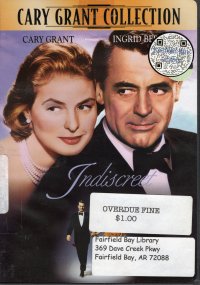 I bought this film in June in Arkansas, and as it had been almost two months since I’d seen a Cary Grant film (three, actually), it was time.
I bought this film in June in Arkansas, and as it had been almost two months since I’d seen a Cary Grant film (three, actually), it was time.
Ingrid Bergman plays a London actress who comes back from a holiday early after yet another suitor cannot hold her attention. Her sister and brother-in-law stop to use her flat to change before a formal dinner and are surprised to find her back. They invite her along, but she demurs because she finds those dinners and their speakers boring. But Cary Grant shows up as the American economist scheduled to speak, invited to also change at the flat from his trip into his evening clothes, and Bergman is smitten. Pardon me if I don’t bother to include the character names–I’ve already forgotten them.
So Grant and Bergman spend a wonderful evening together, but at the end of the night, Grant says that he’s married, separated, but cannot get a divorce–right after Bergman says she hears that from all the men.
But they take up an affair anyway. Wait, what? Blatant immorality in the 1950s? Get out of town!
So the film is them flirting, bantering, and pitching woo until it is revealed that Grant’s character is not actually married–that he just says that because he does not want to get married, and when he has said that in the past, women always thought they would be the one to make him change his mind. Bergman is just such a woman, and she hopes to change his mind. When she finds out, though, that he is not, in fact, married, she is scandalized and plans a surprise when he is to surprise her for her birthday–she plans to be caught in flagrante delicto with an old flame who falls ill, so she has her elderly chauffeur play the role briefly. But it ends happily, though.
You’re watching it to see Grant and Bergman flirt and caper about (well, not as caper as in some other Grant films).
I’ve seen Bergman in a number of films, but something about the color in this film really emphasized the lines between her teeth, and it was distracting.
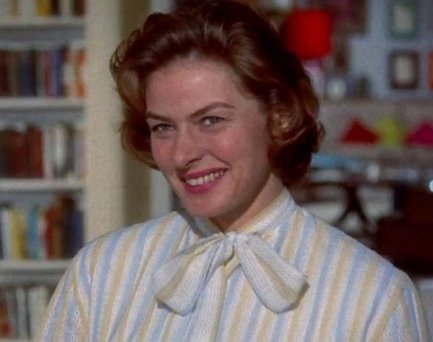
Weird. Probably not on a real woman–now watch me as I stare at women’s teeth in the real world until I’m tased–but not something we generally see nowadays on actresses and influencers due to orthodontia and veneers.
So I got to thinking about the leading men/heroes that played opposite of Ingrid Bergman who I most closely resemble in my own mind. Gentle reader, those include Cary Grant (this film and Notorious which I have yet to see), Humphrey Bogart (from Casablance), and Bing Crosby (The Bells of St. Mary’s which I’ve seen a couple of times and include it in my Christmas film rotation). Of all them, of course, I would prefer to be Cary Grantish, but I am pretty sure I am mostly Humphrey Bogartish (I have had a picture of him on my office wall for…. well, probably not decades, plural, yet, but for a long time). Of course, in this accounting, I have forgotten For Whom The Bell Tolls with Gary Cooper, but it’s been a while since I’ve seen that. I would hunt it down for a re-watch but I have other films I’ve not yet seen to get to first.
At any rate, best viewed by a Grant or Bergman completist, but kind of pedestrian and of questionable moral worldview otherwise.
From Our Oriental Heritage, page 373:
But it would be unfair to judge the people from their kings; virtue is not news, and virtuous men, like happy nations, have no history.
He’s talking about the Persians now and the splendid barbarities they paid upon traitors (painful death, razing whole villages in a manner characteristic of a militaristic leader to come later).
However, the quote reminded me a lot of Tolstoy: “All happy families are alike; each unhappy family is unhappy in its own way.”
The Story of Civilization series differs from most histories, though, that the Durants spend a lot of time covering non-militaristic and non-Great Man threads of history, focusing on the arts and commerce of civilizations especially under the more enlightened leaders of each.
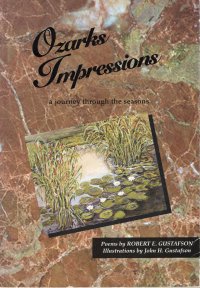 I am not sure when I got this book. It has a Redeemed Books sticker on the back that seems to indicate it was added to their inventory in 2010. So somewhere between then and now. It is a collection of poetry written by a retired economist from a consultancy or think tank and it’s illustrated by his brother, a retired artist. The volume I have is numbered 386 of 1500 and is inscribed to Linda. I found myself musing as much on the history of this book and the men who produced it as the actual contents.
I am not sure when I got this book. It has a Redeemed Books sticker on the back that seems to indicate it was added to their inventory in 2010. So somewhere between then and now. It is a collection of poetry written by a retired economist from a consultancy or think tank and it’s illustrated by his brother, a retired artist. The volume I have is numbered 386 of 1500 and is inscribed to Linda. I found myself musing as much on the history of this book and the men who produced it as the actual contents.
The book contains poems that are built using haikus as the syllable counts for each stanza. The number of haikus per poem, that is, the number of stanzas per poem, varies. The book mostly deals with introspection and landscapes and follows the seasons from spring to winter.
So: okay, the author says they’re haikus, and some of them could stand alone as haikus, but most of them cannot, and they’re just syllable counts for lines in English. I think a much more interesting challenge would have been to make haikus that build upon each other to a common theme or poem, but the poet does not indicate this is the case. Although I am pretty sure the result would have been similar: some good haikus that build to a complete poem, but some haikus that clanged on their own and didn’t rise to independence just serving as filler material in longer poems.
At any rate, an interesting read, fairly quick, sometimes enjoyable, but sometimes questionable. I remember one poem talking about a fox eating turkeys, and given the relative size and feistiness of each, I had a hard time believing it to be true. I would need a Dablemont ruling on that.
So if you can find one of the other 1,499 copies available, it might be worth a glance if only to think What if I tried that?
Also, as an aside, something I learned in Our Oriental Heritage: Apparently, the Japanese were so crazy for hokku when they first came out that they had competitions on who could write the best and they bet on it until the Japanese government put it down (Our Oriental Heritage, 881). I am not sure I would have bet on Gustafson unless I knew something about the other guy.
At the top of the KY3 home page today:
This weekend on KY3, and hence further down the home page:
Truly, they have a dizzying intellect!
Also, it’s possible the Web/social media team is different from the actual news team.
Our Oriental Heritage page 265:
For barbarism is always around civilization, amid it and beneath it, rady to engulf it by arms, or mass migration, or unchecked fertility. Barbarism is like the jungle; it never admits its defeat; it waits patiently for centuries to recover the territory it lost.
In this volume, the first, this will be a recurring theme. This starts the chapter on Assyria, the barbarians in the equation, about to pounce on the remains of Babylon.
Those who do not know history are doomed to repeat it. Those who know history issue unheeded warnings to the ignorant and are ignored.
Two die in Ironman triathlon as witness says ‘race should never have gone ahead’:
Two men died while taking part in the “brutal” swimming leg of an Ironman triathlon event in Ireland with disruption from Storm Betty that made the water “choppy”.
The storm had been battering County Cork, where the event was taking place, and conditions were “brutal” as competitors took to the water, a witness said.
I am not a fan of the open water swim. I am also not a fan of competitive swimming in the ocean. Come to think of it, I am not really a swim fan.
This Saturday, though, I did compete in my first sprint-length triathlon, and I did better than I hoped. Longer swims expose my lack of swimming ability and make me far less competitive, so I finished about 6th from the bottom.
Forensically, I look back and think I could have trimmed some of my swim time if I had not positioned myself second-to-the-end of the indoor pool snake-swim where you line up according to speed–I was faster than the woman I was behind, but I did not pass her as I was doing the triathlon on “cruise” speed, aiming just to finish. The first transition included a run from the YMCA pool to a transition area that was a city block away–run around the YMCA building in a parking lot barefoot, cross some grass, cross an apartment complex’s parking lot, cross some grass, and then part-way across a church parking lot to the transition area where the shoes are.
I made a wrong turn on the bike, too, which added a mile or so until I recognized no police or volunteers were blocking traffic and no bikers finishing the out and back route were passing me any longer. So that added five minutes or more to my time.
Also, I walked probably half of the 5k run at the end. I certainly hadn’t trained for it. I had a time of 35 minutes with the walking–my normal 5k time is right about 30 minutes, so it only added 5 minutes to it.
But I suppose I could have trimmed, what, ten minutes from my overall time? That would have moved me up nine spots, probably still in the bottom third. So, yeah, longer triathlons are not my sport.
When I racked my bike, my old triathlon coach asked me if I was going to stay on it that day. I guess the fact that I laid my bike down on the Tiger Tri three weeks ago and finished it bloody has become common knowledge. He was working the mike at the finish line, and he announced me by calling me a staple of the shorter triathlons. Which I guess I have been this year–I’ve done two indoor triathlons and the two outdoor triathlons this year, which is pretty good for how poor my training regimen has been.
I did get a cool picture from it, though.

Now, after a couple months, I can get back to my real fitness passion: Weightlifting, as I can do so much of it sitting or lying down.
Well, until I decide to train at the last minute for the indoor triathlon at Chesterfield Family Center in late winter.
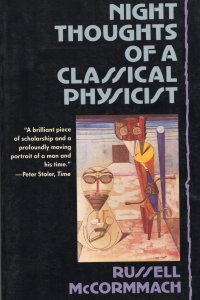 I picked up this book back in 2007, and likely then as now I confused it for “Night Thoughts of a Quantum Physicist” which was a physics lecture given when I was an adult instead of this novel which was written when I was a boy and must have gotten some use as a textbook, as the volume I have contains some note-taking.
I picked up this book back in 2007, and likely then as now I confused it for “Night Thoughts of a Quantum Physicist” which was a physics lecture given when I was an adult instead of this novel which was written when I was a boy and must have gotten some use as a textbook, as the volume I have contains some note-taking.
It is a bit of a non-linear story about a classical physicist at the end of his career in the year 1917. He reflects on his career, the physicists he has known, and how Einstein and quantum theory is really not all that–he still believes that aether is the substance tying everything together, and he bemoans that physics has moved from a mechanical understanding of the universe to a mathematical one. The story is set during World War I, when it was becoming clear that the war was not going well for the Germans, so the war and its impact are a counterpoint to the main character’s story–or an augmentation thereof, as he served during the 1870 war with France. The timeline of the story outside the flashbacks and dreams of being judged for being an inadequate physicist takes place over a couple of days starting with a trip to the theatre and through a talk that the professor gives and beyond. He reflects a bit on the suicide of a peer, which leads to a (spoiler alert) final Did he? Probably!
It’s but 157 pages, so a quick read if you’re in it for the fiction. It also comes with 60 pages of end notes and bibliography, essentially, if you want to see how much research the author went through to get details right. But I’m just here for the story, pal. I’ll deal with the math when I come to a copy of “Night Thoughts of a Quantum Physicist” which I probably have around here somewhere. Actually, I both do and do not until I discover I do, and that copy is right now on my to-read bookshelves vibrating in unison with a copy in Berkeley, California, right now.
An interesting read, more literary than a lot of stuff I stuff into my intellectual gullet, and it kind of reminded me of The Death of Ivan Ilyich by Leo Tolstoy in its end-of-life reflections. Hopefully, the theme is not resonating with me because I am nearing the end of my life, but one never knows. One never knows.